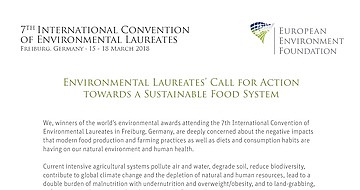We, winners of the world’s environmental awards attending the 7th International Convention of Environmental Laureates in Freiburg, Germany, are deeply concerned about the negative impacts that modern food production and farming practices as well as diets and consumption habits are having on our natural environment and human health.
Current intensive agricultural systems pollute air and water, degrade soil, reduce biodiversity, contribute to global climate change and the depletion of natural and human resources, lead to a double burden of malnutrition with undernutrition and overweight/obesity, and to land-grabbing, unfair wages and poverty, and exploiting animals/livestock.
Damage to land caused by large-scale monoculture, heavy use of chemical fertilizers and pesticides, toxic and radioactive contamination, and waste and runoff from the production of food and especially animal products are accelerating the extinction rate of species and the degradation of ecosystems, imperilling the environmental foundation of our food systems.
Overfishing, pollution and unsustainable aquaculture are damaging the marine and fresh water environment.
The global food system along the entire production-to-consumption continuum must urgently be redesigned in such a way that it meets the needs of each and every person on the planet in a sustainable, equitable and just manner.
Therefore, we call on governments to
- adopt an integrated approach to food and agriculture, linking economic, environmental and health outcomes;
- support international programmes like the One Planet Network Sustainable Food Systems Programme;
- develop policies that incentivise sustainable agriculture, reduce food loss and waste and that promote consumption of healthy and nutritious food;
- eliminate all perverse agriculture and food subsidies;
- recover and promote sustainable indigenous traditional agricultural production, protect wetlands and promote agrobiodiversity;
- phase out the use of glyphosate over the next five years and immediately ban sales to consumers and for use in public spaces;
- place an immediate ban on the use of bee-killing pesticides, including neonicotinoids;
- make it obligatory to internalise externalities wherever possible;
- formulate policy on the route towards regenerative agriculture only;
- make food education part of mandatory curricula;
- support local governments in creating communities that help consumers make healthy and sustainable food choices.
We call on businesses and organisations to
- contribute to transparency in the chain in which they are operating;
- move towards regenerative and agro ecological agriculture;
- move towards a business model with positive social and environmental impacts, adding value to climate, nature and society;
- invest in and support local farmers in the sustainable production of food.
We call on consumers to
- reduce consumption of meat and of other animal-based products;
- buy sustainable or organic fresh, local and seasonal produce whenever possible and eliminate processed foods;
- support small-scale, more organic farming practices to preserve productive agricultural land and prevent climate change;
- put pressure on industrial agriculture corporations.
We call on all farmers to
- adopt sustainable and/or agro-ecological farming practices where possible;
- advocate for a transformation among their peers and marketing organisations towards markets that reward sustainable production.
We call on all stakeholders to contribute to achieving all Sustainable Development Goals, especially Goal 2 to “End hunger, achieve food security and improved nutrition, and promote sustainable agriculture”; Goal 4 to “Ensure healthy lives and promote wellbeing for all at all ages”, and Goal 12 “ Ensure sustainable consumption and production patterns”, as well as the environmentally-related Goals 13, 14 and 15.

 EN
EN

